Alumni during COVID
(June 23, 2020)
Since March, coronavirus (COVID-19) has had a tremendous impact on the way all of us live our lives. The Office of Alumni Engagement has spoken with dozens of alumni over the last two months to hear how the pandemic has affected them personally, and especially professionally.
We graduate HEROES. Clayton State University has been producing nursing graduates for almost fifty years. These alumni have been practicing all over the country and have seen both wonderful and heartbreaking moments. The coronavirus (COVID-19) pandemic sweeping the country has shone a light on the heroic work nurses, and other healthcare workers, have been doing this entire time.
“At my hospital (Hunter Holmes McGuire VA Medical Center in Richmond, Virginia), as a Certified Registered Nurse Anesthetist (CRNA), I am normally providing anesthesia to keep people safe and comfortable,” said Lukeythia Bastardi ’06. “Since the COVID-19 outbreak, I’m putting my skills as an expert in airway management, ventilator management, and critical care to use for our COVID-19 intensive care unit (ICU) patients. Some of these patients require intubation so they can be placed on a ventilator, and I spend nights at the hospital so I can be immediately available to place these tubes if needed.”
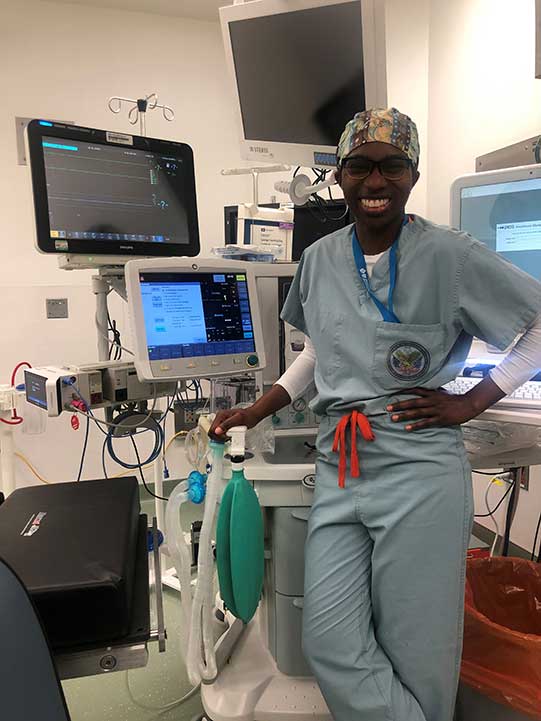
New graduate Kiren Hassin ’19, an emergency room (ER) nurse working on the front lines with COVID-19 patients at Emory Decatur Hospital, noted that her residency classes were being modified and rescheduled as she began her time right as COVID-19 was deemed a global pandemic. She has to take great care to maintain her health and safety, as well as her patients, friends, and loved ones.
“After my shifts, I change out of my scrubs entirely before I step foot into my car,” Hassin said. “I have distanced myself away from my family and friends. While this is mentally and emotionally upsetting, at the same time, it’s my way of expressing my love and care for them.”
Ernestina Bonsu ’12, a nurse at AnMed Health in South Carolina, noted that while her hospital might not be experiencing as many COVID-19 cases as others, the virus is still affecting her work.
“Less than 5% of our patient population is COVID-positive,” Bonsu said. “The problem we are facing as providers is that patients with chronic conditions are not seeking medical care. They are not following up with their primary care physician due to social distancing measures in place. Most of these patients are brought to the emergency room by EMS when they are too sick.”
Bonsu went on to say, “As a frontline worker, this has been a huge challenge created by COVID-19 pandemic. As we focus on the pandemic, patients with chronic medical conditions are also dying at an alarming rate because they are scared they might catch the virus if they seek medical care.”
Clayton State alumni are not only working as nurses on the front lines; they are also overseeing those nurses. Merry Heath ’09, Chief Nursing Officer at Piedmont Fayette Hospital, reflected that while she never would have expected to be in the position of leading or living through a pandemic, she never doubted that nurses would step up to the challenge.
Heath continued to describe the resilience and commitment of nurses, “COVID-19 has shaken the foundation of healthcare to a degree that is unimaginable. The commitment and dedication of frontline workers have gone above and beyond. Stretched to the limit has taken on a whole new meaning. But our inner strength, perseverance, and God-given abilities have become so relevant during these times.”
There have been several nursing alumni who have left their homes to serve in some of the hardest-hit areas of the country.
As the COVID-19 pandemic crisis really ramped up in New York City, the USNS Comfort was sent from its homeport in Norfolk, Virginia to New York to help treat both COVID and non-COVID patients. On board the ship was Clayton State nursing alumnus, Blake Dunn ’17.
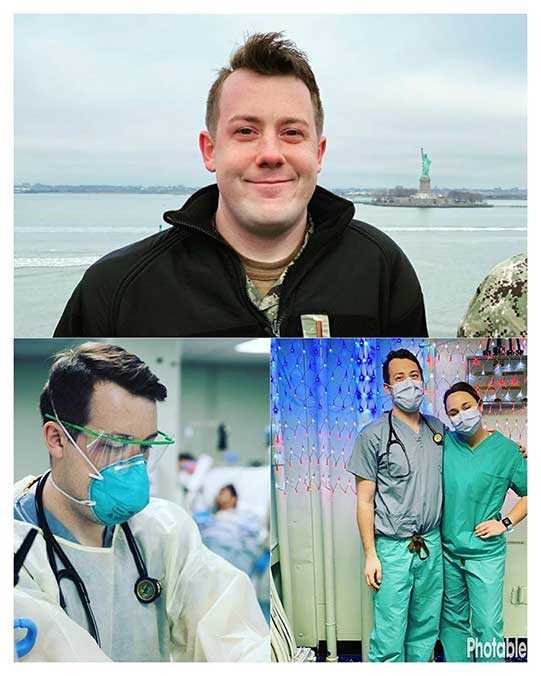
Tanyetta Brown, a two-time Clayton State nursing alumna, has also spent time in New York City, at Elmhurst Hospital, considered one of the epicenters of the coronavirus battle. She recounted the harrowing experiences she’s had by saying, “As a nurse on the frontline, I have had to hold hands of dying patients so they would not feel alone. I have also arranged video chats for families to see their loved ones who were actively dying.”
Brown goes on to note the impact on nurses does not simply extend to physical and mental exhaustion.
“This virus has not only affected me mentally, but it has also affected me emotionally and spiritually. My contract ends at the end of this month, and I’m really considering seeing a therapist.”
Though there were a lot of upsetting experiences, Brown did say the time spent in New York was worth it.
She recalled, “I have seen some of the most critically-ill patients infected with this virus make a full recovery which brought tears of joy to my eyes.”
Tykweisha Wilson ’16 took an assignment at Los Angeles Surge Hospital, a temporary state-funded hospital specifically for COVID-19 patients, for thirteen weeks. Working in the ICU three or four days a week, she said, “Now that I am here, I see how detrimental this virus can be to any individual. Patients are in the ICU on ventilators for several weeks. Doctors, nurses, and respiratory therapists from California and all over America are collaborating to provide the best plan of care for each patient.”
Another 2016 alumna, Latisha Isaac, traveled to California to assist with the outbreak there. She described her experience in San Bernadino, “Being thrown into the lion’s den was terrifying. I was stressed, fearful, and full of a lot of self-doubt. But I feel honored to have been able, available, and equipped to be put in unfamiliar territory during the start of a pandemic and be of help to my fellow healthcare workers. With God on my side, I finished strong, and, most importantly, I am safe.”
On her excitement to return home, Isaac said, “It was nice to challenge myself and be used in these unprecedented times, but I am so homesick. This experience has made me prioritize my life even more. While every single patient I came in contact with remains in my thoughts and prayers—as well as their family members I never met—I look forward to hugging and kissing mine.”
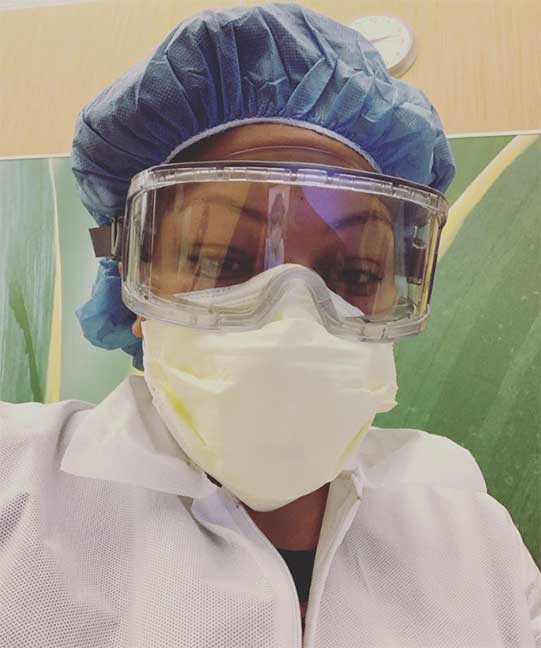
When thinking about the pandemic, Mai Nguyen ’13, ’17, who works at Piedmont Fayette, has become more steadfast in her profession. She reflected, “While it is hard working during times like this, it is definitely the most rewarding career choice ever.”
Nguyen went on to thank the School of Nursing faculty and said, “Clayton State prepared me to be a safe, competent, and compassionate nurse.”
Hassin added, “I have had the opportunity to learn even beyond my imagination in the midst of the current pandemic, and I am so grateful that Clayton State University’s School of Nursing prepared and equipped me with the knowledge to be able to do well on the front line.”
Wilson further stated, “My previous education and experience is what has shaped and molded me into the nurse I am today. I take pride in knowing that I am able to make a difference no matter how far away from home I may be.”
Other nursing alumni have mentioned they are grateful for the outpouring of support from the community and how it’s helped keep up their spirits. Monica Newland ’19, an ICU nurse at Piedmont Henry, noted, “I’m coping with the stress by trying to find the positive. Since I love food, I look forward to the days we get lunch and goodies.”
To read about another Clayton State nursing alumna, Ashley Feddern Pryzbek, see this Atlanta Journal-Constitution article released in early May.
Teaching has long been a rewarding, though at times difficult, profession. The coronavirus (COVID-19) pandemic has certainly not made things easier, but Clayton State alumni who are in the now-virtual classrooms have adjusted, finding new ways to provide instruction and communicate with their students, and continue to make a positive impact on the future.
Listening to these alumni’s stories, it’s easy to understand the deep passion they have for their students.
One such alumna is Aliyah Allen ’18, who is a sixth grade teacher at Coile Middle School in Athens. “We’re role models, cheerleaders, counselors, and many more,” Allen says. “When I found out that we weren’t going to be back with the students physically and was required to teach digitally, I began to think more of the students and their well-being.”
Tevin Smith ’14, sixth grade mathematics teacher at Paul D. West Middle School in East Point, noted that the relationship between students and teacher need to become even closer due to COVID-19. He said communication becomes increasingly key to success.
“Students that you would see each day, excited to enter into the learning environment to complete their tasks, were the very ones that you would not be able to see or interact with for few days at a time.”
Allen elaborated that she was worried the time away from the physical classroom might have an impact on the students mentally. However, she stepped up and made sure her students were doing well.
“Through my digital learning platform, before I began any of my live sessions, I did a wellness check.” She continued, “This allowed the students to inform us on how they were feeling, along with asking me and my co-teacher questions about the times that we are living in.”
Smith went on, though, to note how parents are also facing difficult times. He relayed a message he hears regularly, that parents do not know how to do certain tasks asked of their student and want to know how to help.
Another alumna, Andrea Caine ’12, a third grade teacher at Edmonds Elementary in Forest Park, further noted that with many of her students not having access to laptops or internet, there is an added importance of communicating with her students’ parents, “I’ve been texting my student’s parents everyday with quick activities they can do to engage in learning without using internet or computer.”
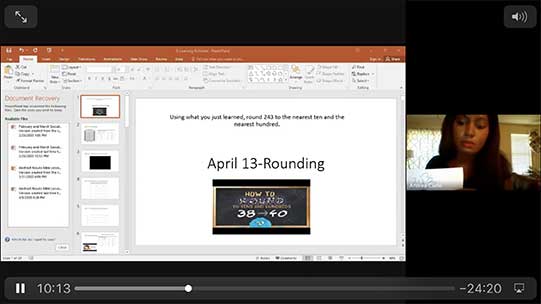
Like many of us whose jobs have required an adjustment in the way we accomplish our daily tasks, teachers have had to make changes, and have learned lessons along the way. Smith reflected that having his lessons live online did not create an environment with diligent and consistent engagement.
He recalled, “As time passed, I became more ‘digitally smarter’ and began to record lessons through PowerPoint, which was more conducive to the content and modeling steps through examples. It helped a lot as students were able to re-watch the video on the parts they misunderstood.”
Ultimately, Smith found the changes he made were successful.
“Student participation once again increased, and I could see they were understanding the content as I reviewed their grades,” he said.
In addition to the teachers in the education field, those in administration are also having to make adjustments. Harold Walker ’11, Assistant Principal at Mount Zion High School in Jonesboro, noted, “The impact of the pandemic at work compelled my team and me to creatively think of innovative ways to support the community and provide meaningful instruction to the students we serve.”
Walker continues, “As we continue into the unknown, it is going to require a lot of forward thinking to remain effective in our fields. I believe as we exercise patience and compassion to others, we will learn how to adjust and adapt in no time.”
In the midst of all the turbulence, these Clayton State alumni educators are making the best of the situation for themselves and their students.
“Overall, I enjoy being with (my students) every day virtually,” was a sentiment expressed by Smith.
Alumni in law enforcement have also seen challenges due to COVID-19. Lloyd Owens ’10, Police Sergeant at Georgia Highlands College and Police Officer for the City of Lovejoy, noted the pandemic has been difficult both personally and professionally.
Owens said that due to his day-to-day interactions with the public, “I have been put in a position where I have not been able to be around my family.”
There have still been changes to Owens’ department that have helped limit the risk for acquiring the disease, such as responding to some calls for service via telephone if they do not require human interaction.
He went on note his hours have been greatly expanded as other officers go into quarantine. Owens even had his own scare: “I myself was placed on leave due to symptoms of COVID-19; fortunately, I tested negative and was able to return to serving the people during these trying times.”
Director of Security for Atlanta United, and police officer, Scott Ashworth ’15, highlighted how coronavirus has impacted both the law enforcement and the sports and entertainment industry. When thinking about how we can have sports re-open from a safety and security standpoint, Ashworth said, “The main thing is to make sure people are safe. You don’t want just the appearance; you want to ensure that people truly are avoiding getting sick.”
Considering the societal changes that have taken place over the past few months, it makes sense that crime and law enforcement has seen changes. Some types of crimes have seen a major decrease, while other crimes have increased.
Ashworth explained, “Crime overall is down significantly. Home burglaries have gone down significantly because everybody is at home. Package stealing has decreased because people are home, but that also causes violent crimes to increase because people are being confronted. Shoplifting is down because stores aren’t open. The counter to home burglaries going down is commercial burglary goes up as fewer people are at work.”
With many companies, organizations, and other entities facing budget struggles and the need for employees to practice social distancing, the human resources profession has had to adapt. Dr. Lauren Huff ’05, Director of Human Resources for the Georgia Emergency Management and Homeland Security Agency (GEMA), noted that one of her difficulties was trying to figure out how to continue maintain operations while keeping herself and her colleagues safe.
Huff said, “I was still expected to bring on new staff despite everything that was going on. I could not wrap my head around how I would do this while still practicing social distancing.”
She continued by remarking that many HR professionals have to either convince or assure some managers of employees’ ability to tele-work, especially indefinitely. Further, she highlighted the technical issues needed to be overcome to ensure new hires are onboarded appropriately, as well as that current employees could receive necessary items to tele-work, such as new identification badges, computer equipment assignment from the IT department, and issuance of uniforms and vehicles.
InterContinental Hotels Group Human Resources Manager, Joshua Rochester ’07, ’09, further stated, “As an HR professional…the decisions we are guiding the business through now are tough—considering that six months ago we were at record low unemployment. Now the choice is about the need to temporarily lay off employees and when the right time is to recall.”
With travel and other expenditures down, the hotel and hospitality industry has been hit especially hard. Rochester explained why by saying, “A core thing to remember about hotels, airlines, and other similarly situated segments is that the shelf life of our ‘product’ expires at the end of each day—if not sooner. If a room is not occupied, or a seat not filled, we simply cannot build up a supply and sell it later when demand returns.”
Given the economic principle of supply-and-demand, with lower demand for hotel rooms, the industry has had to limit hours or lay off employees. Further complicating matters, Rochester said, “The business that does exist now are frontline responders, individuals self-isolating, or some other short-term piece of business. This has caused concern for some employees who are worried about their own health or the health of their family.”
Supply chains have also seen a dramatic shift in what would be considered the “new normal.” Ryan Marsh ’14, General Manager of Americold Logistics, LLC, noted that panic buying had an immediate impact on his company, which distributes food products to major retail companies.
“With pressure being placed on the manufacturers to produce more than planned, distribution centers and carriers to increase their capacity to replenish the shelves,” Ryan said.
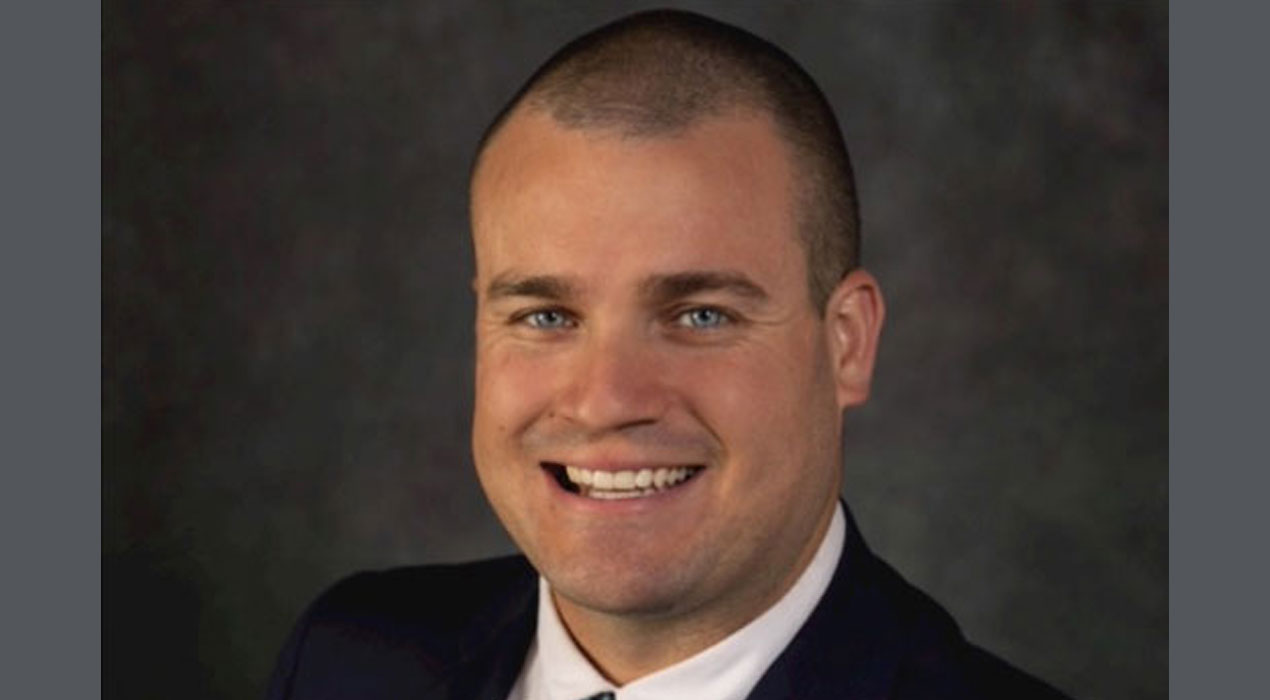
He added to not be fooled into thinking that empty shelves mean there is a food shortage, “There is typically 3+ months of food supply in the pipeline. It simply must go through the channels to replenish the shelves.”
Christopher Narcisse ’12, ’16, Area Manager for Wal-Mart eCommerce Fulfillment, noted his company saw demand increase by over 300% after the pandemic started. With people already buying more items online than ever prior to the pandemic, fulfillment centers across the country were already at maximum capacity.
With the new rise in demand, Narcisse explained he had to prepare for a huge influx of employees, “My location implemented new processes to improve the flow of associates in and out of the facility, support social distancing, and maintain a safe and sanitary work environment for all associates.”
Still other alumni have been giving back to their community during the coronavirus pandemic. As Mask Up Sumter Chair, Reda Rowell ’93, ’98, ’09 and the Rotary Club of Americus partnered with several other organizations in southwest Georgia to secure and deliver much-needed resources to front line heroes in the fight against COVID-19. Through these efforts, 79 gallons and 230 (8 ounce) bottles of hand sanitizer, 220 face shields, and 25 N95 masks were distributed to various first responders, nursing homes, and other areas directly affected by the pandemic in one of the hardest hit areas in the country.
Clayton State University alumni have shown throughout the COVID-19 pandemic their resilience, pride in their work, and passion for their fellow humans. We are grateful for all of our alumni who in the face of adversity have continued to make a positive impact on our society. If you have a story of how the pandemic has affected your life you’d like to share with the Alumni Association, please feel free to share them with us at alumni@clayton.edu.
